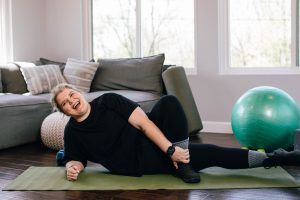
Madison had always kept herself healthy through sports. In college, she had been a triathlete and a softball player, but during graduate school, her studies took up all her time. Now that she was starting her first job as a therapist, Madison promised herself she would make time for athletics again.
Then the pandemic hit, and Madison’s outgoing, active lifestyle was squashed. She could feel her physical and mental health declining until she could barely leave her apartment to go to the grocery store. As her anxiety increased, so did her weight. At her heaviest, Madison weighed 505 pounds.
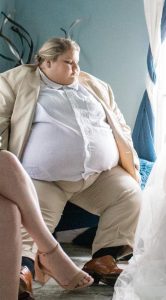 “It got to a point where I was like, ‘It’s now or never,’ Madison said. “I have to get myself back or I’m not gonna make it to 30.”
“It got to a point where I was like, ‘It’s now or never,’ Madison said. “I have to get myself back or I’m not gonna make it to 30.”
Two things happened that set Madison on the road to recovery. First, Madison’s kindly grandmother took her in in July 2021, and offered to support her while she rebuilt her self-confidence. Second, Madison took an environmental research job that offered less stress and more flexibility. With a support system in place, Madison felt strong enough to begin working to restore her health.
Madison began searching for bariatric services in Kentucky. Several hospitals caught her eye, but as soon as she visited the Kentucky Bariatric Institute, she knew it was the right place. The nurses and staff gave her a sense of support and community she couldn’t find anywhere else. Not only did she feel cared for holistically, but she felt heard and respected – which, as a therapist, Madison knew is essential for wellness. When she decided to schedule a sleeve gastrectomy, her dietician communicated clearly and realistically what she would first need to get done.
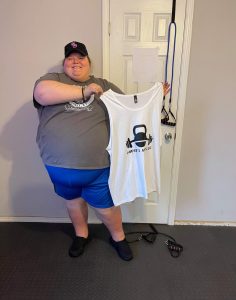 Before she could undergo surgery, Madison had to lay the groundwork for a healthy lifestyle. In August 2021, she joined a women-only gym and began visiting twice a week. Each session left her so exhausted she could barely climb the stairs to her home. She measured her progress in small victories – being able to do a sit-up. Being able to walk on the treadmill again. Gradually, these victories accumulated. By the time she sat down on the operating table in December of that year, Madison had already lost 75 pounds.
Before she could undergo surgery, Madison had to lay the groundwork for a healthy lifestyle. In August 2021, she joined a women-only gym and began visiting twice a week. Each session left her so exhausted she could barely climb the stairs to her home. She measured her progress in small victories – being able to do a sit-up. Being able to walk on the treadmill again. Gradually, these victories accumulated. By the time she sat down on the operating table in December of that year, Madison had already lost 75 pounds.
“People ask, ‘What’s your motivation?’” Madison said. “I’m like, ‘Motivation’s a lie.’ It’s literally discipline. It’s the discipline to want to stay healthy and be healthy, to be able to help others, to help yourself, to be able to be with family and friends, and to live as long as I can.”
The day of Madison’s surgery was life-changing. Her best friend, who she kept in touch with online, drove from nine hours away to offer support. When Madison awoke from her operation, she felt panicked, but seeing her friend there gave her the strength to relax. That night, as she rested in the hospital, Madison could feel that she was about to get her life back. Over the next month, her recovery at home was made harder by a bad case of COVID, but throughout it all Madison felt supported – by her friends, her grandmother, and her team at the Kentucky Bariatric Institute, who was always there to offer her guidance, care and encouragement.
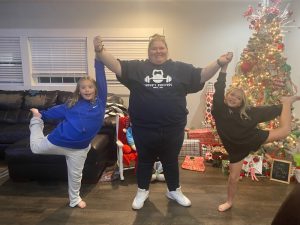 Two months after her surgery, Madison felt strong enough to rejoin the gym. Six months post-operation, her doctors declared her non-diabetic. Gradually, her daily cocktail of cholesterol and blood pressure medications was reduced to a simple multivitamin. Today, 16 months after her procedure, she has lost 286 pounds.
Two months after her surgery, Madison felt strong enough to rejoin the gym. Six months post-operation, her doctors declared her non-diabetic. Gradually, her daily cocktail of cholesterol and blood pressure medications was reduced to a simple multivitamin. Today, 16 months after her procedure, she has lost 286 pounds.
Friends and strangers compliment Madison on how much better she looks, but for Madison, physical appearance was never the point.
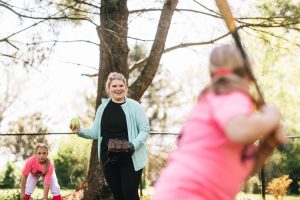 “When I was 500 pounds, I felt like I was on fire constantly,” Madison said. “Now I don’t feel that burden. That 11-year-old girl who couldn’t stand the way she looked – now I hope to make her proud, because now we get the life and the body and the energy that we deserve.”
“When I was 500 pounds, I felt like I was on fire constantly,” Madison said. “Now I don’t feel that burden. That 11-year-old girl who couldn’t stand the way she looked – now I hope to make her proud, because now we get the life and the body and the energy that we deserve.”
Madison is proud of all the work she’s done, and glad that she can be a healthy role model for her younger sisters. But most of all, she’s happy to be full of energy.
“I feel the most active and healthy that I’ve ever been in my life,” Madison said. “I used to be a triathlete and do every sport, but I feel healthier now in my skin than I ever have. And I never want to take that for granted.”
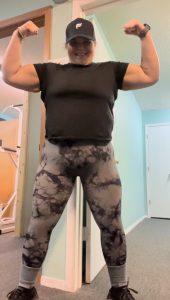 Madison has a new goal now: sharing her journey with others. Around 9 months after her surgery, she realized how little representation there was online for people like her – girls in their mid-20s who once weighed 500 pounds or more. Madison began chronicling her weight loss journey through TikTok, recording exercise videos and talking about her experience has a bariatric patient. As her following grew, she discovered there was a whole community of bariatric influencers on the platform. Soon she was joining livestream events and connecting with patients who were 10 or 20 years post-surgery.
Madison has a new goal now: sharing her journey with others. Around 9 months after her surgery, she realized how little representation there was online for people like her – girls in their mid-20s who once weighed 500 pounds or more. Madison began chronicling her weight loss journey through TikTok, recording exercise videos and talking about her experience has a bariatric patient. As her following grew, she discovered there was a whole community of bariatric influencers on the platform. Soon she was joining livestream events and connecting with patients who were 10 or 20 years post-surgery.
“I was like, ‘These are my people,’” Madison said. “Being able to make friends who relate to you, who know what you’re going through with your health and your fitness and your struggles – I needed that.”
Madison has big plans for the future. She wants to write a book about growing up in a food desert where healthy eating was almost impossible. Someday, she hopes to start a nonprofit for bariatric patients like herself. More than anything, though, she’s grateful for everyone who helped her get to where she is now.
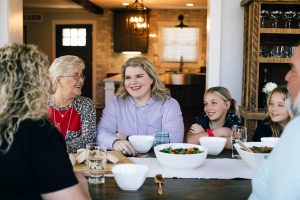 “If it weren’t for the Kentucky Bariatric Institute, if it wasn’t for my grandmother, if it wasn’t for this job, if it wasn’t for my peers, I wouldn’t be as successful as I am today,” Madison said. “I know this is about me, but this is really about them, who have influenced me to be who I am today.”
“If it weren’t for the Kentucky Bariatric Institute, if it wasn’t for my grandmother, if it wasn’t for this job, if it wasn’t for my peers, I wouldn’t be as successful as I am today,” Madison said. “I know this is about me, but this is really about them, who have influenced me to be who I am today.”
